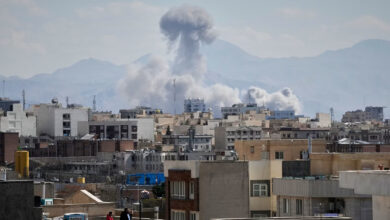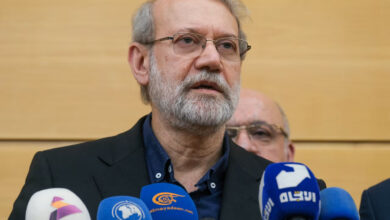Jerusalem–Israel's historic peace treaty with Egypt provided an unexpected dividend: For the first time ever, the Israeli press corps was able to cover a crisis in the Arab world on the ground.
Many of these first-hand accounts of the revolt that toppled longtime Egyptian leader Hosni Mubarak focused on the protesters' calls for freedom. It was a sharp contrast to politicians in Israel, who tended to support Mubarak and warned the upheaval might endanger the frosty peace between the two nations.
"This was an important story about Egypt's struggle for democracy," said Haaretz newspaper reporter Anshel Pfeffer, one of the dozen or so Israelis who covered the Egyptian turmoil from Cairo. "It wasn't about Israel's relationship with Egypt."
Yizhar Be'er, head of the Israeli media watchdog group Keshev, said Israeli analysts painted a "more threatening" picture, predicting radical Islamists would take over Egypt.
"The Israeli journalists on the ground painted an opposite picture," he said. "They saw with their own eyes that there are democratic processes happening."
One report, by Channel 10 TV's Moav Vardi, followed two young Egyptian protesters, a flight attendant and an engineer, around the streets of Cairo. The female flight attendant, who speaks fluent English, was shown marching confidently among a crowd of men, chanting pro-democracy slogans. At one point, music swelled as she collected trash from the streets, saying she was cleaning up her country.
"What can you do?" Vardi asked during the report. "You identify with her."
Although Israel has a robust and combative press, its Arab affairs correspondents are based in Israel and they frequently cite unidentified senior Israeli officials as the source of their material. Critics like Be'er say some news organizations mouth the official Israeli position on its Arab neighbors.
By contrast, the Israeli journalists reporting from Cairo were not Arab affairs correspondents: They stayed behind to report from their studio perches.
Because Israel has made peace with just two Arab states — Egypt and Jordan — its media are banned from entering most Mideast trouble spots.
There have been some exceptions. Several Israeli journalists received special permission to report from Egypt in 1977 when Egyptian President Anwar Sadat paid a landmark visit to Israel to pave the way for a peace treaty. A few with dual citizenship have traveled on foreign passports to cover events in countries otherwise off-limits.
But the free access to Egypt came like the uncorking of a bottle. Israel's main dailies, television channels and state radio all sent correspondents.
Israel Radio reporter Gideon Kouts, who generally files from Paris, said his presence in Cairo helped to debunk myths back home.
Kouts said when he reported that Mubarak supporters roughed him up in Tahrir Square, studio commentators were shocked, saying the Egyptian leader was a trusted friend of Israel and the West.
"This kind of presence is important," Kouts said of his on-the-ground reporting. "It breaks stereotypes."
While exhilarated by being in the thick of things, Israeli correspondents said they had to hide their nationality because 30 years of peace have not erased the hostility ordinary Egyptians feel toward Israelis.
"It was very clear that it would have been very dangerous to walk around and tell people I am Israeli," said Vardi, the TV correspondent. He said he did not even reveal his identity to the protesters he filmed.
After he told American and other foreign colleagues he was Israeli, "They told me, 'You're crazy to be here,'" Vardi said.
Four days after he arrived in Cairo, Egyptian officials stopped Vardi on 31 January, discovered he was an Israeli journalist and detained him for two hours. Vardi said he was not harmed, but Channel 10, fearing for his safety, pulled him out of Cairo and flew in a replacement.
Two days later Channel 10 withdrew his replacement, Chico Menashe, because of violence directed at foreign journalists of all nationalities. A half dozen Israeli correspondents were on the flight back home, including reporters from Israel's three main TV news channels, Menashe said.
Kouts, the Israel Radio reporter, said he did not want Egyptians to hear him broadcasting in Hebrew, so he would switch to English or suddenly go off the air if a group of Egyptians passed by.
The round-the-clock coverage from Egypt drew viewers: Channel 2 TV said ratings rose both times it switched to live uninterrupted broadcasts, though a spokeswoman said it was impossible to say if the Israeli correspondents' presence in Cairo drew viewers.
Still, the firsthand reporting didn't seem to convince Israelis that Egyptian demonstrators would bring democracy.
A survey by Israel's Dahaf Research Institute showed that 84 percent of Israelis polled thought the Egyptian upheaval would fuel Islamic extremism, while 11 percent thought it would promote democracy. Only 4 percent thought the Egyptian turmoil meant good news for Israel.
The 3 February survey of 500 people, conducted for Israel's parliament TV, had a margin of error of 4.5 percentage points.




